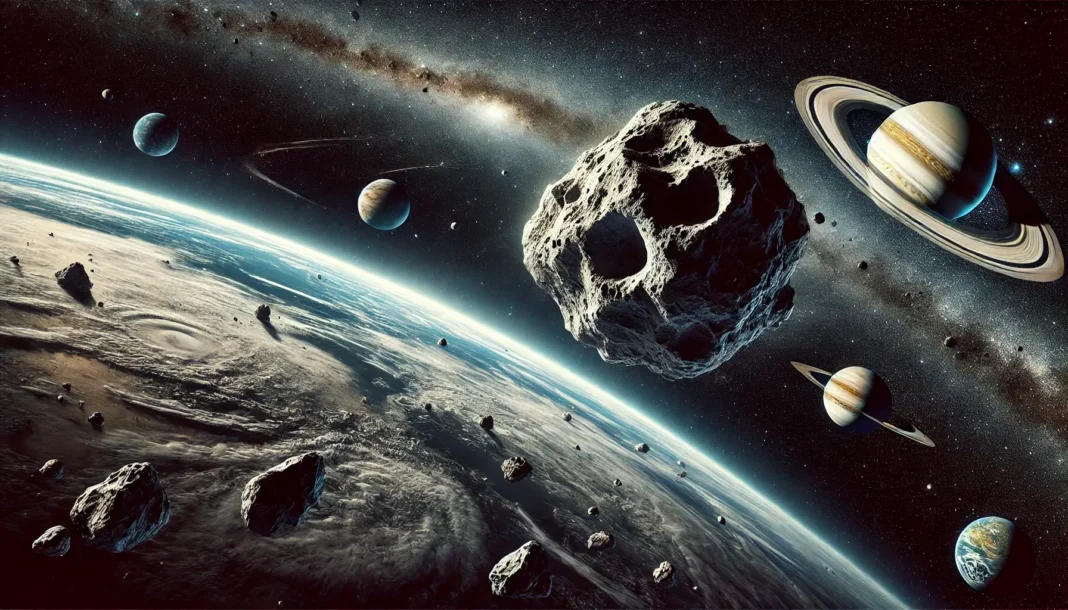German scientists have made significant strides in unraveling the mystery behind the origin of the asteroid that wiped out the dinosaurs 66 million years ago. Their latest findings suggest that this catastrophic space rock, known as the Chicxulub impactor, originated from the outer regions of our solar system, far beyond Jupiter’s orbit, during the solar system’s early formation.
The Chicxulub Impactor: A Cosmic Catastrophe
The origin of the asteroid that wiped out the dinosaurs has long intrigued scientists and paleontologists. The Chicxulub impactor is widely believed to have caused the mass extinction event that ended the reign of non-avian dinosaurs and dramatically altered Earth’s climate. This massive space rock crashed into what is now the Yucatán Peninsula in Mexico, creating the Chicxulub crater and triggering a chain of events that led to the extinction of 75% of life on Earth.
The exact nature and origin of the Chicxulub impactor have been subjects of intense debate among researchers. While previous studies have offered various theories, the new evidence presented by geoscientists from the University of Cologne strengthens the case that the asteroid originated from beyond Jupiter’s orbit.
Ruthenium: The Key to the Asteroid’s Origins
The German research team, led by Mario Fischer-Gödde, focused on the presence of ruthenium, a rare element found in asteroids but extremely scarce in Earth’s crust. By analyzing geological remnants from the Chicxulub impact collected in Europe, the scientists discovered isotopes of ruthenium that pointed to the asteroid’s origin in the outer solar system.
Their findings suggest that the asteroid that wiped out the dinosaurs belonged to a group of carbonaceous asteroids formed beyond Jupiter. The presence of ruthenium in the sedimentary layers formed after the impact provided strong evidence supporting this theory. According to researcher Carsten Münker, the Chicxulub impact represents a unique and rare event in geological history, one that sealed the fate of dinosaurs and many other species on Earth.
The Impact and Its Consequences
The Chicxulub impactor, estimated to be at least 10 kilometers in diameter, struck Earth with such force that it vaporized rocks and sent a vast amount of dust, debris, and gas into the atmosphere. This catastrophic event blocked sunlight, halted photosynthesis, and caused a drastic drop in global temperatures, leading to the mass extinction of species that marked the end of the Cretaceous period.
The impact also triggered massive tsunamis, wildfires, and other environmental disasters, further contributing to the extinction event. The geological boundary between the Cretaceous and Paleogene eras is characterized by a layer of sediment that contains elevated concentrations of platinum-group elements, including ruthenium, which marks the time of the asteroid impact.
The Debate: Asteroid vs. Volcano
While the asteroid that wiped out the dinosaurs is widely accepted as the primary cause of the mass extinction, some scientists argue that massive volcanic eruptions may have also played a role. The Deccan Traps in India, known for their extensive volcanic activity around the same time as the Chicxulub impact, have been proposed as a contributing factor to the extinction event.
An October study reignited this debate, suggesting that the volcanic eruptions might have destabilized the ecosystem before the asteroid impact, creating conditions that were already inhospitable to life. The study points to critical levels of sulfur released by the eruptions, which could have caused a global drop in temperatures, further exacerbating the extinction event.
The Origin of the Asteroid: New Evidence
Despite the ongoing debate about the role of volcanic activity, the new evidence from German researchers adds weight to the theory that the Chicxulub impactor was an asteroid from the outer solar system. By measuring ruthenium isotopes in the impact deposits, the team compared the data with various classes of meteorites representing potential impactor compositions. Their results confirmed that the Chicxulub impactor was a carbonaceous asteroid, distinct from other impact events caused by silicate asteroids formed closer to the Sun.
The research highlights the uniqueness of the Chicxulub impact and its far-reaching consequences for life on Earth. As Fischer-Gödde and his team continue their work, they hope to uncover more details about the early solar system and the events that shaped our planet’s history.
Conclusion: The Legacy of the Chicxulub Impactor
The discovery of ruthenium isotopes in the Chicxulub impact deposits marks a significant step forward in understanding the origin of the asteroid that wiped out the dinosaurs. This research not only sheds light on the catastrophic event that ended the age of dinosaurs but also provides insights into the formation and evolution of our solar system.
The ongoing exploration of ancient impact events and their effects on Earth’s geology continues to reveal the complex interplay between cosmic forces and life on our planet. As scientists delve deeper into the mysteries of our solar system, they bring us closer to understanding the origins of life-altering events like the Chicxulub impact.
For more detailed insights into the Chicxulub impact and its global consequences, visit the University of Cologne’s research page and the NASA Asteroid Watch.











